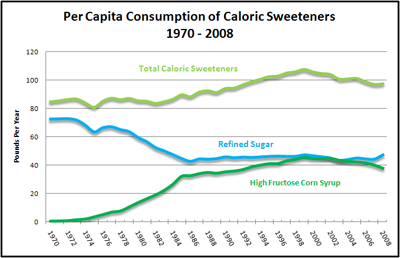Huh? What is the point? People are consuming more calories than they burn so they're becoming fatter?
HFCS has been substituted into the food supply, so they are consuming more.
Consuming more what? HFCS has replaced sucrose on a nearly one-for-one basis. HFCS and sucrose offer the same number of calories per gram. What are you talking about?
And the way the body processes fructose, a calorie is not a calorie.
A calorie is a measure of the amount of energy. This is how it is defined. It is always the same no matter what. We understand that efficiencies will be different. Why is this so hard for you to grasp? If you don't understand even this simple thing, maybe you shouldn't be offering opinions on Lustig, or anything to do with nutrition.
Lustig goes through the science
I don't believe for a second that Lustig thinks a calorie is not a calorie.
HFCS is everywhere. Lustig cites a source that went shopping for bread - 32 or so different types, only one with no HFCS.
Have you ever tried to make bread without sugar? Good luck. If they didn't use HFCS, they would have used sucrose. That example pretty much explains why HFCS has replaced sucrose on a nearly one-for-one basis.
He also talks to the way fructose supresses the "I'm full" digestive process, causing people to overeat
The HFCS used in bread is 42% fructose. Sucrose would be 50% fructose. Since the bread with HFCS has less fructose, and more glucose, it must cause people to NOT overeat because it provides greater stimulation to the "I'm full digestive process" than sucrose, right?
I eat a healthy diet. Real food, ie, no processed stuff.
Real Food? What does that even mean? No processed stuff? What an absolutely boring was to go through life. No ice cream? No pasta? No pizza? No juicy burgers with a sourdough bun? No fried chicken? No spicy chicken wings? No fresh bread right out of the oven? No beer? No wine? No fresh squeezed orange juice or apple cider? No iced tea? No fresh brewed coffee? You never enjoy any Christmas candy? Don't eat chocolate? Never go to an Italian or Mexican restaurant?
Good grief, now I'm feeling sorry for you.
Yet, when I changed yogurt to one with no HFCS, I dropped an additional 4 lbs.
Was there no sweetener used in the new one at all or did you switch to one using sucrose? Since HFCS offers the same relative sweetness as sucrose, and both ingredients offer 4 calories per gram, please explain how this is possible. No, on second thought don't.
None of the criticism I've seen challenges his basic science
Saying that fructose and ethanol are metabolized in the same manner would place his understanding of basic science in question. Using studies where rats are fed three times (or more) the amount of fructose that the average American consumes might be problematic, don't you think? If Lustig thinks that the human body handles HFCS differently than hydrolyzed sucrose, then he is, once again, at odds with established science. Given these glaring problems, I am not surprised that he would be wrong about the amount of sugar in the Japanese diet. It would also be interesting to hear him explain away why the same problems he cites are occurring in countries that don't eat nearly as much fructose as we do and where HFCS isn't used.
